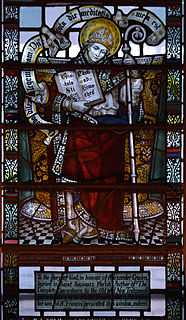Alexis was a Greek comic poet of the Middle Comedy period. He was born at Thurii in Magna Graecia and taken early to Athens, where he became a citizen, being enrolled in the deme Oion (Οἶον) and the tribe Leontides. It is thought he lived to the age of 106 and died on the stage while being crowned. According to the Suda, a 10th-century encyclopedia, Alexis was the paternal uncle of the dramatist Menander and wrote 245 comedies, of which only fragments now survive, including some 130 preserved titles.
The 4th century BC started the first day of 400 BC and ended the last day of 301 BC. It is considered part of the Classical era, epoch, or historical period.
Year 347 BC was a year of the pre-Julian Roman calendar. At the time it was known as the Year of the Consulship of Venno and Torquatus. The denomination 347 BC for this year has been used since the early medieval period, when the Anno Domini calendar era became the prevalent method in Europe for naming years.

Demosthenes was a Greek statesman and orator of ancient Athens. His orations constitute a significant expression of contemporary Athenian intellectual prowess and provide an insight into the politics and culture of ancient Greece during the 4th century BC. Demosthenes learned rhetoric by studying the speeches of previous great orators. He delivered his first judicial speeches at the age of 20, in which he argued effectively to gain from his guardians what was left of his inheritance. For a time, Demosthenes made his living as a professional speech-writer (logographer) and a lawyer, writing speeches for use in private legal suits.
This article concerns the period 349 BC – 340 BC.

Solon was an Athenian statesman, lawmaker and poet. He is remembered particularly for his efforts to legislate against political, economic and moral decline in archaic Athens. His reforms failed in the short term, yet he is often credited with having laid the foundations for Athenian democracy. He wrote poetry for pleasure, as patriotic propaganda, and in defence of his constitutional reform.
Year 335 BC was a year of the pre-Julian Roman calendar. At the time, it was known as the Year of the Consulship of Calenus and Corvus. The denomination 335 BC for this year has been used since the early medieval period, when the Anno Domini calendar era became the prevalent method in Europe for naming years.
Apollodorus was a popular name in ancient Greece. It is the masculine gender of a noun compounded from Apollo, the deity, and doron, "gift"; that is, "Gift of Apollo." It may refer to:

The Areopagus is a prominent rock outcropping located northwest of the Acropolis in Athens, Greece. Its English name is the Late Latin composite form of the Greek name Areios Pagos, translated "Hill of Ares". The name Areopagus also referred, in classical times, to the Athenian governing council, later restricted to the Athenian judicial council or court that tried cases of deliberate homicide, wounding and religious matters, as well as cases involving arson of olive trees, because they convened in this location. The war god Ares was supposed to have been tried by the other gods on the Areopagus for the murder of Poseidon's son Halirrhothius.
The name Dionysius was common in classical and post-classical times. Etymologically it is a nominalized adjective formed with a -ios suffix from the stem Dionys- of the name of the Greek god, Dionysus, parallel to Apollon-ios from Apollon, with meanings of Dionysos' and Apollo's, etc. The exact beliefs attendant on the original assignment of such names remain unknown.

Athens is one of the oldest named cities in the world, having been continuously inhabited for perhaps 5,000 years. Situated in southern Europe, Athens became the leading city of Ancient Greece in the first millennium BC, and its cultural achievements during the 5th century BC laid the foundations of Western civilization.
Eubulus was a statesman of ancient Athens, who was very influential in Athenian politics during the period 355 BC to 342 BC and was notable for his abilities in managing Athenian finances.

Timotheus is a masculine male name. It is a latinized version of the Greek name Τιμόθεος (Timόtheos) meaning "honouring" (Τιμό) "God" (θεος). The English version Timothy is a common name in several countries.
Callistratus or Kallistratos may refer to:
"Against Meidias" is one of the most famous judicial orations of the prominent Athenian statesman and orator Demosthenes.
Diagoras "the Atheist" of Melos was a Greek poet and sophist of the 5th century BC. Throughout antiquity, he was regarded as an atheist, but very little is known for certain about what he actually believed. Anecdotes about his life indicate that he spoke out against ancient Greek religion. He allegedly chopped up a wooden statue of Heracles and used it to roast his lentils and revealed the secrets of the Eleusinian Mysteries. The Athenians accused him of asebeia (impiety) and banished him from their city. He died in Corinth.
Archestratus was a 4th-century BC gastronomic poet.
L'Estrange is a surname of French origin which may refer to:
This page is based on this
Wikipedia article Text is available under the
CC BY-SA 4.0 license; additional terms may apply.
Images, videos and audio are available under their respective licenses.




